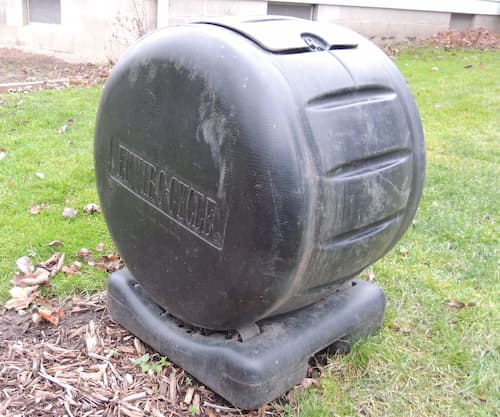How to Make Organic Compost Tea

About Organic Compost Tea
Every gardener should use compost tea. Along with its cousin “manure tea“, they are the “liquid gold” of flower, herb, and vegetable gardening. It’s the perfect organic liquid fertilizer, to feed all of your plants. If you are not currently making and using this “liquid gold” fertilizer, you are likely spending money on chemical-based fertilizers. Don’t you think it’s time to stop spending hard-earned cash, and use free, easy-to-make, organic fertilizer? Sure you do!
Yes, organic compost tea is easy to make. It’s a by-product of the composting process. Just collect the liquid draining out the bottom of your compost pile or composter. You can also make it, by soaking compost in water for a few days. The material releases nutrients and minerals into the water, which is then drained off for use in feeding your garden plants.
When is the best tea time for your plants? ……….Anytime! Any and every plant responds positively, with new, greener growth. In liquid form, nutrients and minerals are readily absorbed by your plants. It reaps fast rewards with greener leaves, bigger, brighter blooms, and larger, more prolific fruits and vegetables. From the minute your seedlings emerge, to the final days of fall, your plants benefit from the nutrient-rich ingredients of compost tea.
Organic gardeners…… compost tea is for you. It is completely organic!
Gardening Tip: Your indoor houseplants like this tea, too. Apply it once a month and see the difference in your indoor plants.
How to Make Compost Tea
Use any large container, from a 5-gallon bucket to a 55-gallon drum. Fill the container loosely with a variety of plant waste. Or, fill a burlap bag with compost, and insert this “tea bag” into the container. Yes, you can toss in a little manure, too. Fill the container with water. Stir the mixture every day. Aeration is important to the process of making compost tea. After a week, your tea is ready to use.
Drain off the liquid. Strain out solid particles. If you are going to use the liquid fertilizer in a garden sprayer, strain the tea through a cheesecloth or other fine mesh, to remove small particles that can clog the sprayer.
Tip: You do not have to use it all at once. If you only need a little, take what you need, leaving the rest to continue to steep, until you need it.
The resulting pure compost tea is likely too strong for your plants. If you put a lot of “greens” into the tea, the nitrogen content can be so high, that it burns the plants. Therefore, before applying the tea to your plants, mix 10 parts of water with one part of compost tea. This 10:1 ratio dilutes the nutrient levels, so the tea can be safely applied and absorbed.
Spread or bury leftover solid material in your garden, put it back into your composter, or onto the compost pile for later use.
Tip: Apply this liquid fertilizer for foliar feeding, too. Sprinkle diluted tea on the plant leaves. Nutrients in the tea, are readily absorbed by the leaves.
Important Note: The liquid nutrients in the tea, is used immediately by plants. Because it is in liquid form, it washes out of your soil quickly. Frequent applications are recommended.
Liquid Fertilizers Versus Solid Granular Fertilizers
Because they are in a soluble form, liquid fertilizers like organic compost tea, have an almost immediate impact on your plants. The nutrients are quickly absorbed by the plant’s root system. The benefit of liquid fertilizers is short-lived. In liquid form, the nutrients do not remain in outdoor soil for very long. The benefit to your houseplants is longer, as the nutrients are retained in the planter.
Solid, granular fertilizers and compost, release nutrients more slowly over some time. However, it takes longer to begin to benefit your plants. But it lasts for weeks.
We believe the best fertilization program utilizes a combination of both liquid and solid fertilizers. However, in both cases, we encourage you to go organic. It’s much better for the environment and your plants.
Compost Tea Related Topics
How to Make and Use Organic Manure Tea – without a doubt, it’s a great garden fertilizer
What to Compost – discover what materials to use and what not to use.
Compost and Mulch – in short, use these liberally in your garden.
About Composters – learn about compost tumblers, compost bins, and their features.
Please support our site. Shop for:
- rmmatthews100@hotmail.com
- 585-721-6528
- Rochester, NY
©1999-2024 GardenersNet.Com, All Rights Reserved

